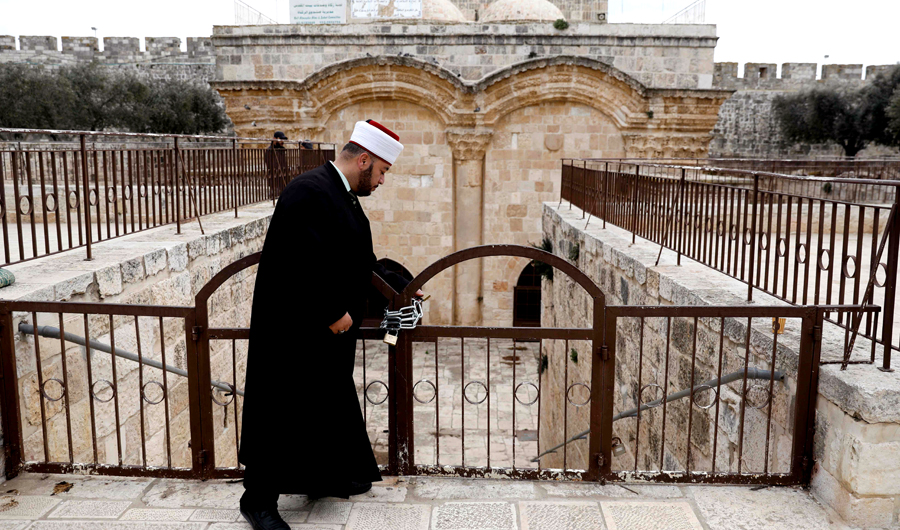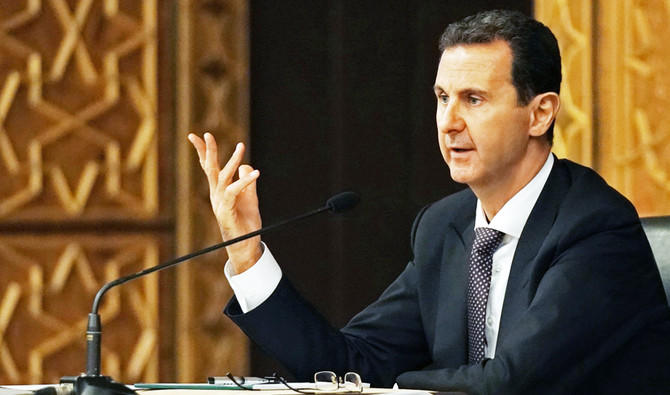US-backed forces evacuate families before final assault on militants
NEAR BAGHOUZ, SYRIA: US-backed forces in eastern Syria scrambled on Wednesday to extract more families from the last sliver of Daesh’s proto-state before delivering a final blow to holdout militants.
Several thousand people — fighters and their relatives — are believed to be holed up in the last pocket of territory controlled by Daesh, barely half-a-square kilometer near the Iraqi border.
The so-called Daesh is only days away from dying in a tiny village few Syrians had ever heard of until recently.
Thousands of its last denizens, many of them women and children, have been pouring out of the riverside hamlet of Baghouz in recent days, posing a huge humanitarian challenge for the Kurdish fighters leading the operation.
Survivors of the months-old siege spilling out of the double-trailer trucks that transported them out of Baghouz tell harrowing tales of starvation and many of the evacuees require immediate medical attention. Lines of black-veiled women holding scruffy children and carrying their scant belongings in bags can be seen walking across the plain.
Save the Children said many of the surviving children have witnessed devastating events in recent months and are “showing signs of psychological distress.”
The men are carefully screened by the Kurdish-led Syrian Democratic Forces (SDF), who have spearheaded the battle against Daesh in Syria, with support from a US-led coalition.
According to the Syrian Observatory for Human Rights, about 10 percent of the estimated 50,000 people who fled the last militant bastions since December were Daesh members trying to slip back into civilian life.
The diehard militants, among them many foreigners, still clinging to the last patch of the proto-state in Baghouz have also been using civilians as human shields.
Footage captured by the BBC from positions held by Iraqi paramilitary forces across the Euphrates River shows an improvised camp, where what appears to be a militant can be seen running among makeshift tents.
As warplanes fly overhead, a woman is seen collecting water from the river in a plastic jerry can while black men move stealthily among the jumble of minivans and civilian shelters that make any direct airstrike impossible.
The SDF launched its final offensive against Daesh territorial control in September 2018.
The operation has been deadly and slow, with one top French officer even publishing stinging criticism of the coalition’s reluctance to fully involve its ground forces.
US President Donald Trump announced late last year he was ordering a complete troop pullout from Syria, leading the SDF exposed to Turkish military threats.
A security vacuum could also see a quick resurgence of Daesh, which has lost all its bastions in Syria and Iraq but remains a potent guerrilla force.
Even the US military warned that Daesh could potentially re-establish territorial control in some areas with six months “absent sustained counterterrorism pressure.”
Almost eight years into a conflict that has killed more than 360,000 people, the humanitarian emergency showed no sign of relenting.
With aid agencies struggling to provide basic relief to famished civilians evacuated from the remote Baghouz area, Save the Children highlighted the trauma the youngest among them had suffered.
The children who fled Daesh-held areas were “likely to have witnessed acts of brutality and lived under intense bombardment and deprivation in the last enclave held by the group,” the British charity said.
One of the children cited in the report was an 11-year-old named Mai.
“I always tried not to look when there were beheadings. I would hide behind my mum,” she was quoted as saying.
The charity stressed much more needed to be done to help these children.
“That includes funding and access for case management and protective services, and for foreign children repatriation to their countries of origin,” said Save the Children’s Syria response director, Sonia Khush.
The local Kurdish administration is struggling to cope with the humanitarian burden and has repeatedly urged the world to step up its aid effort.
The countries of origin of detained militants are reluctant to repatriate them, fearful of the impact such returns could have on security and on public opinion.

Russia, Syria call on US troops to leave SyriaHundreds more leave Syria Daesh holdout: AFP reporter



